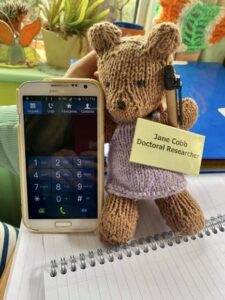A Praxis funded Research, Scholarship and Innovation project led by Professor Joan Simons in HWSC (Health, Wellbeing and Social Care)

![]()
If you have a tutor there that is supporting you throughout your studies or that you know knows and understands your conditions or your mental health, that in itself is so helpful because you feel supported and you feel that, OK, they’re there, they understand, they get it.
![]()
Introduction
This blog post summarises a critical OU study led by Professor Joan Simons and funded by Praxis – WELS Centre for Scholarship and Innovation. It explores how Associate Lecturers (AL) at the Open University can provide practical support for students who share that they have mental health difficulties and thus help them succeed in their studies. This research is of particular importance because although there has been an increase in students with declared mental health issues over the past few years, they are the most likely to be unsuccessful in their studies or even drop out entirely. Therefore, focus group discussions were organised to identify ways to help these students continue and succeed in their studies.
Results
The results of this study showed ways that the OU can support their associate lecturers so they can, in turn, support the students they have with shared experiences of mental health issues. Firstly, students strongly preferred email as their primary communication method, as it allowed them to take the time needed to formulate their thoughts carefully. However, some noted the challenges of miscommunication via email. In contrast, phone calls were generally seen as stressful unless scheduled in advance. Secondly, some students struggled with Tutor Marked Assignments (TMA) and found that getting extra support from their tutors was hugely valuable. Finally, students had difficulties navigating the OU resources.
Discussion
Personalised communication was seen as essential in building solid tutor-student relationships. Students appreciated individualised, rather than generic, responses from tutors, which made them feel supported and valued. Timely responses and clear boundaries around tutor availability also helped alleviate anxiety. To help students who share they they have a mental health condition and based on the results of this study, Joan proposes the development of an intervention aimed at enhancing academic and pastoral support for students with shared mental health difficulties. This intervention would include regular check-ins, tutor video introductions, clear boundary-setting, and structured communication. The impact of these strategies will be assessed by tracking retention and attainment rates.
On the other hand, students also noted a significant variation in how well different tutors understood and supported mental health challenges. Some felt that a lack of understanding from their tutors hindered their progress, indicating a need for more standardised training. A warning light that students who are likely to experience mental health issues need extra support or a modification in the support they are receiving is if they are asking for repeated extensions.
Conclusion
In conclusion, based on the results of this study, Joan aims to implement various modifications to the support that students who share that they have experienced mental health issues receive. For example, comprehensive academic and pastoral support will be tailored to students with mental health difficulties. Interventions will include personalised check-ins and engaging video introductions that respect these students’ requests for precise boundary settings. Additionally, regular check-ins will be organised in time for the TMAs, and extra support will be provided if necessary. The effectiveness of future support will be rigorously assessed using questionnaires, focus group discussions with ALs and feedback sent to the OU. Additionally, participating students’ retention and attainment rates will be compared against their peers. By better understanding the needs and preferences of students who share they they have a mental health condition, the OU will be better equipped to help them fulfil their studies and continue to a successful and satisfying future.
We would love to hear about your experiences of mental health (directly or in supporting others) and study in higher education. What more should the sector be doing. Please send us a comment in the box below.
Thanks to Lesley Fearn for peer reviewing and helping to shape this blog post.

Dr Lesley June Fearn is a secondary school English teacher in southern Italy. She is also an affiliate researcher at the Open University’s (UK) Faculty of Well-being, Education, and Language Studies (WELS), where her research centres on linguistics and sociocultural theory.


 I have been an Associate Lecturer at the Open University since 2002, tutoring mainly English language modules. I live in Stourbridge in the West Midlands with my husband, two adult children and three Romanian rescue (street) dogs. My recent EdD and my current research interests concern the multiple perspectives around feedback practices around assessed writing in HE. This is my first venture into blogging, and I am looking forward to this creative space, where colleagues can share, debate, and discuss issues arising around their research.
I have been an Associate Lecturer at the Open University since 2002, tutoring mainly English language modules. I live in Stourbridge in the West Midlands with my husband, two adult children and three Romanian rescue (street) dogs. My recent EdD and my current research interests concern the multiple perspectives around feedback practices around assessed writing in HE. This is my first venture into blogging, and I am looking forward to this creative space, where colleagues can share, debate, and discuss issues arising around their research. The OU’s conference on professionalism and posthumanism fascinated me as someone who has worked in campaigning around literacy and education in England and Scotland. I now work in early years practice while pursuing an education doctorate. During this time, I have witnessed policy changes come and go. Despite the frustrations of governments and institutions, I remain optimistic that we can work through them because we have to, especially with the looming challenges of the climate crisis. In my experience, the short-term illusion that the neo-liberal world offers can be alluring, but there is no silver bullet to anything. I have been influenced by Vivian Gussin Paley’s (reference) storytelling approach to literacy, which is subtle and complex and has stayed with me much longer than England’s national literacy hour policy. Therefore, the problem I focus on is balancing the demands of professionalism and posthumanism in the early years’ sector.
The OU’s conference on professionalism and posthumanism fascinated me as someone who has worked in campaigning around literacy and education in England and Scotland. I now work in early years practice while pursuing an education doctorate. During this time, I have witnessed policy changes come and go. Despite the frustrations of governments and institutions, I remain optimistic that we can work through them because we have to, especially with the looming challenges of the climate crisis. In my experience, the short-term illusion that the neo-liberal world offers can be alluring, but there is no silver bullet to anything. I have been influenced by Vivian Gussin Paley’s (reference) storytelling approach to literacy, which is subtle and complex and has stayed with me much longer than England’s national literacy hour policy. Therefore, the problem I focus on is balancing the demands of professionalism and posthumanism in the early years’ sector.
 In considering which perspectives were essential to explore to understand feedback practices within this context, three distinct participant groups emerged clearly in terms of their allocated roles within the feedback process. These comprised those who study and pay for tuition (students), those who facilitate and deliver a pedagogical service by working directly with students (tutors) and those who design and write the module and monitor the process of its delivery and assessment, manage staff and appoint tutors (central academics).
In considering which perspectives were essential to explore to understand feedback practices within this context, three distinct participant groups emerged clearly in terms of their allocated roles within the feedback process. These comprised those who study and pay for tuition (students), those who facilitate and deliver a pedagogical service by working directly with students (tutors) and those who design and write the module and monitor the process of its delivery and assessment, manage staff and appoint tutors (central academics).